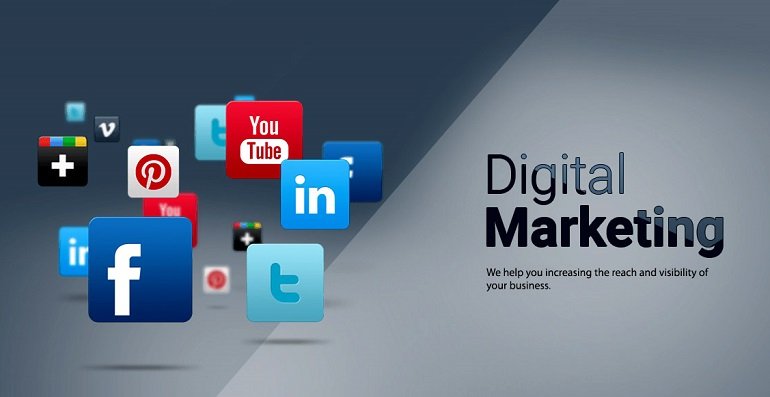What is Digital Marketing?
Digital marketing refers to all marketing efforts that use an electronic device or the internet. Businesses leverage digital channels such as search engines, social media, email, and websites to connect with current and prospective customers. It encompasses a broad range of tactics and strategies, including search engine optimization (SEO), content marketing, social media marketing, email marketing, pay-per-click (PPC) advertising, and more.

Why Digital Marketing Matters
The importance of digital marketing cannot be overstated. Here’s why:
- Wider Reach: Digital marketing allows you to reach a global audience. With the right strategy, your content can go viral and reach people far beyond your local area, opening up new markets and opportunities.
- Cost-Effective: Compared to traditional marketing methods like TV ads or print media, digital marketing is often more affordable and offers a better return on investment. Even small businesses can compete with larger companies by using smart digital marketing strategies.
- Measurable Results: One of the biggest advantages of digital marketing is the ability to track and measure results in real-time. Tools like Google Analytics and social media insights allow you to see what’s working and what needs improvement, enabling you to refine your strategy for better results.
- Targeted Marketing: Digital marketing enables highly targeted marketing efforts. You can tailor your campaigns to specific demographics, interests, and behaviors, ensuring your message reaches the right people at the right time.
- Engagement and Interaction: Digital marketing fosters direct interaction with customers. Social media platforms, for instance, allow brands to engage with their audience through comments, messages, and shares, building relationships and trust.
Key Components of Digital Marketing
To fully harness the power of digital marketing, it’s important to understand its key components:
- Search Engine Optimization (SEO): SEO involves optimizing your website and content to rank higher in search engine results, making it easier for people to find you online. It includes keyword research, on-page optimization, link building, and technical SEO.
- Content Marketing: Content is king in digital marketing. Content marketing focuses on creating and distributing valuable, relevant, and consistent content to attract and retain a clearly defined audience. This includes blog posts, videos, infographics, and eBooks.
- Social Media Marketing: Social media platforms like Facebook, Instagram, Twitter, and LinkedIn are powerful tools for building brand awareness, engaging with customers, and driving traffic to your website. Each platform requires a unique strategy to maximize its potential.
- Email Marketing: Email marketing remains one of the most effective ways to nurture leads and convert them into customers. A well-crafted email campaign can drive traffic, boost sales, and build customer loyalty.
- Pay-Per-Click (PPC) Advertising: PPC is a model of internet marketing where advertisers pay a fee each time one of their ads is clicked. Google Ads and social media ads are popular PPC platforms. This method is highly effective for driving targeted traffic to your website.
- Affiliate Marketing: This performance-based marketing strategy involves partnering with affiliates who promote your products or services in exchange for a commission on sales. It’s a great way to expand your reach without upfront costs.
- Analytics and Data: Effective digital marketing relies on data. Analytics tools help you understand your audience, measure the success of your campaigns, and make data-driven decisions. Continuous analysis and optimization are key to long-term success.
The Future of Digital Marketing
Digital marketing is constantly evolving, with new technologies and trends emerging all the time. Some key trends to watch in the coming years include:
- Artificial Intelligence (AI) and Machine Learning: AI is revolutionizing digital marketing by enabling more personalized and efficient customer interactions. From chatbots to predictive analytics, AI tools are becoming increasingly important.
- Voice Search Optimization: As more people use voice assistants like Siri and Alexa, optimizing for voice search is becoming crucial. This involves focusing on natural language queries and long-tail keywords.
- Video Marketing: Video content continues to dominate online platforms. Short-form videos, live streaming, and interactive content are particularly popular and effective in engaging audiences.
- Social Commerce: Social media platforms are increasingly becoming shopping destinations, with features like Instagram Shopping and Facebook Marketplace. Brands that leverage social commerce can tap into a growing trend of online shopping.
- Privacy and Data Security: With growing concerns about privacy and data security, digital marketers must prioritize transparency and protect customer data to build trust and comply with regulations.
Conclusion
Digital marketing is an essential component of any successful business strategy. By understanding its key components and staying up-to-date with the latest trends, you can create effective campaigns that reach your target audience, drive engagement, and ultimately, grow your business. Whether you’re just getting started or looking to refine your approach, embracing digital marketing will help you stay competitive in an increasingly digital world.